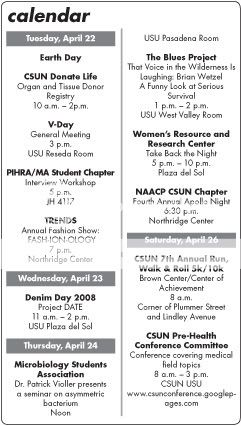In the quest to solve the countless problems associated with climate change and environmental degradation, debates have raged for years on exactly what should be done. The fact is, everyone can do something, no matter how small – and with Earth Day, now would be the perfect time.
Today marks the 38th anniversary of Earth Day, a worldwide event celebrated with programs meant to educate the public on environmental issues.
Founded by Gaylord Nelson, a U.S. senator from Wisconsin and coordinated by Denis Hayes, a Harvard University graduate student, the first Earth Day was held in 1970. It included demonstrations and rallies by college students across the country protesting the rapid progression of environmental deterioration caused by pollution, deforestation and the poisoning of the waterways.
Since then, Earth Day has become an international event meant to bring awareness and change on these issues. In the U.S., the first Earth Day led to the creation of the United States Environmental Protection Agency and the passage of the Clean Air, Clean Water and Endangered Species acts.
The fact that Earth Day began as a grassroots movement and has become an international observance proves that change, no matter how small at first, can make a huge difference.
Small changes in habit, if practiced by enough people, can impact larger institutions across the world. One issue everyone grapples with these days is the price of fuel.
As Los Angeles is the largest ‘car culture’ in the U.S., biking to work or school may not be a viable solution for many people. Other changes, however, can be just as beneficial.
It is estimated that swapping one incandescent light bulb for a compact fluorescent light bulb would eliminate the equivalent of the emissions created by one million cars. In other words, making changes that are appropriate to where you live can still bring about transformation.
Finding energy efficient solutions to problems like our addiction to oil requires everyone to make these changes and stick with them. Small changes made by average people can influence larger institutions, governments included. So far, however, discussion seems to be the only form of activity that groups big and small have engaged in.
As the topic of climate change continues to be addressed in a variety of forums (and by people with a variety of opinions), problems continue to spiral out of control. On February 28 an ice shelf seven times the size of Manhattan broke away from the Wilkins glacier in Antarctica.
While the odds can seem insurmountable at times (and gluing glaciers back together is not feasible), now would be the time to take action instead of debating and merely discussing the issue. It’s no secret that younger generations are more actively involved in finding answers, as climate change will have a greater impact on their future.
Students across the U.S. will participate in Earth Day this year, as the number of planned programs has reached an all time high according to Earth Day Network, a non-profit environmental and conservation organization.
Earth Fair, an annual program sponsored by Associated Students at CSUN, will be held today on the Matador Bookstore lawn. From 10 a.m. to 2 p.m., students can participate in games, booths and entertainment while gathering information on environmental issues.
While Earth Day programs provide a chance to get out and enjoy different activities, it should really be used as a springboard to make simple changes that have not yet been made. Many students are already aware of the environmental crisis on hand, but we could all be doing more to make this planet a healthier place to be.






